Can Childhood Trauma Impact Your Personality Type?
Did you know that nearly 60% of adults report experiencing at least one adverse childhood event? These experiences often shape how we see the world—and even how we perceive ourselves. Trauma, especially during our formative years, can create coping mechanisms that mask our natural personality preferences. As an MBTI® practitioner, I’ve worked with countless individuals who feel disconnected from their “true” type, struggling to reconcile their behaviors with what feels authentic to them.
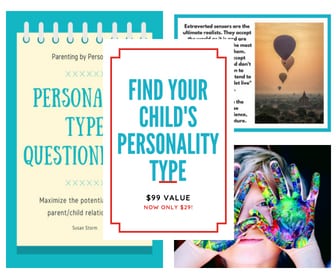
Today, let’s explore how childhood trauma influences personality development and typing. If this resonates with you, let’s dive in together.
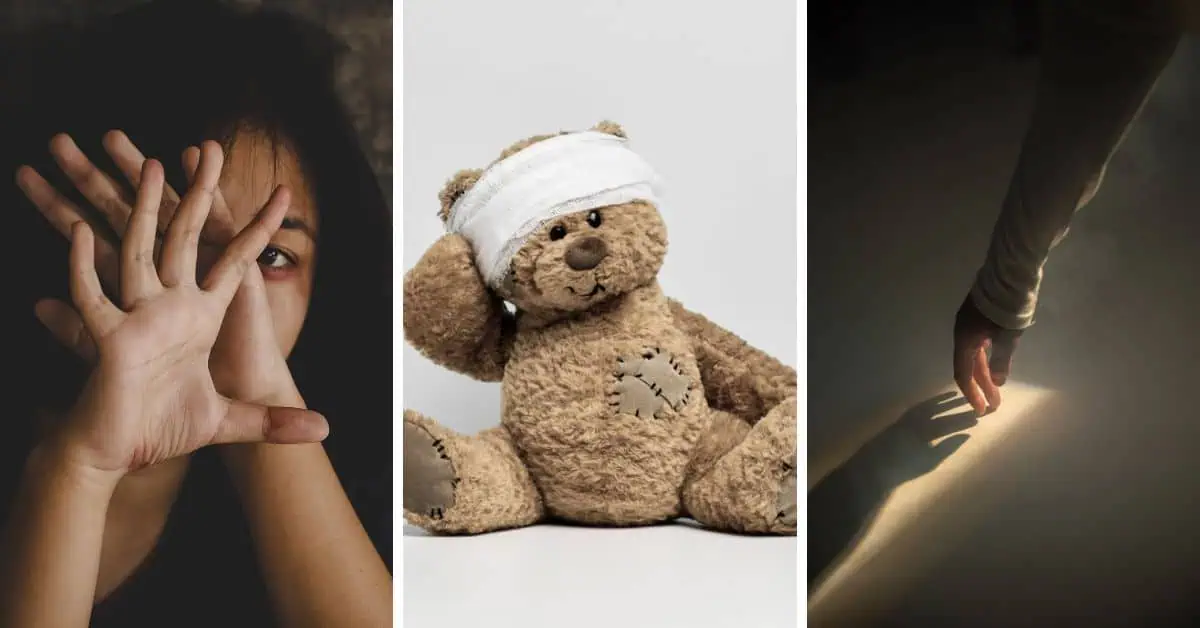
How Childhood Trauma Impacts Your Results On a Personality Questionnaire
Childhood trauma doesn’t change your innate personality type, but it can distort the results of personality questionnaires—like a cracked mirror reflecting a distorted image. These quizzes often measure “typical” responses, which may not account for the effects of trauma, stress, or environmental influences.
For instance, an ENFJ raised in an abusive environment might learn to suppress their natural Extraverted Feeling (Fe) tendencies. Instead of being expressive and empathetic, they withdraw, finding safety in logic and self-reliance—traits associated with Introversion or Thinking. When taking a personality test, their answers might reflect survival strategies rather than true preferences, resulting in a mistyped INTJ result.
Studies in neuroscience have shown that children who aren’t nurtured or who are maltreated as children can experience a number of changes in their brain structure and chemical activity which will affect their behavior and social and emotional functioning.
“Toxic stress can alter brain development in ways that make interaction with others more difficult. Children or youth with toxic stress may find it more challenging to navigate social situations and adapt to changing social contexts (Hanson et al., 2010).” – Understanding the Effects of Maltreatment on Brain Development
An Extrovert or Feeling type who is recovering from a severely abusive or neglectful childhood might seem more withdrawn and introverted, and they might seem less aware or concerned with social constructs and the feelings of others. As a result, they could walk away from a personality questionnaire with a completely useless and inaccurate type result. Of course, as we’ll see later, the opposite can happen as well.
Here are some questions you can ask yourself if you feel like your personality type has been impacted by adverse childhood experiences:
- “Have there been moments in my life when I felt safe and truly myself? What qualities did I express in those moments?”
- “Do I find myself answering personality test questions based on how I act now or how I wish I could act?”
- “What coping mechanisms have I developed to protect myself, and how might they differ from my natural tendencies?”
Childhood Trauma and Introversion Results
In a 1995 case study on life after trauma, researchers found that college students who had experienced early childhood trauma, “scored higher on Neuroticism, were more introverted, and were less emotionally stable than nontraumatized participants. Traumatized individuals also reported more cognitive disturbances, emotional blunting, and interpersonal withdrawal.” The same study also showed that traumatized individuals were more pessimistic and constricted their positive moods.
In the Psychology Today article, “Maybe You’re Not an Introvert. Maybe It’s a Trauma Response” Dr. Robyn Koslowitz explains how adverse childhood experiences (ACEs) can affect the social conditioning of young children and stay with them through adulthood.
“Even a child born with a more extraverted temperament, who normally would love the social world, can be taught via bullying that the social world is a dangerous place, where people are waiting to mock you or physically harm you.” – Robyn Koslowitz Ph.D.
Children learn so many things as they grow up, from how to walk, talk, and add numbers, to how to “read” people and make (or not make) friends. Children are constantly learning; picking up on clues, deciphering body language, and looking to find out whether they are safe or not.
Think of your personality like a compass. Trauma can distort the magnetic field, making it harder to find your true north.
Koslowitz says, “When a child is experiencing a normal, adaptive childhood, with good-enough parenting, they have the wherewithal to experiment on the playground and learn the hidden curriculum alongside the standard one. They have enough psychological resources in their bank account to risk rejection, to try something new, and to handle conflict.”
However, when a child’s emotional bank account is in the red, when they are not supported at home, abused, or lacking in love or affection, they have very little energy to give to social experimentation. Koslowitz poses the idea of a child, Sarah, asking other children to play with her at the playground. She explains the differences between a well-adjusted child asking others to play versus a child who is experiencing trauma or neglect.
“We know that social rejection activates the same pain receptors in our brain as physical pain….If Sarah has enough psychological resources in her mental bank account, this is worth the risk. They may say no—and that will activate pain receptors in her brain—but it’s OK. She has other friends. She has supportive teachers and parents. It will hurt for a moment, but then she gets to go home, talk it through with her parents, and get some support. She’s not spending her last psychological dime on this encounter.”
But if Sarah has a psychological bank account that’s in the red, if she already depleted all her psychological resources just getting through her morning, dealing with the adversity in her little life, with no hope of support when she comes home, she’s not going to risk that “no.” She doesn’t have the resources to waste. Sure, they might say yes, and that might be the beginning of a beautiful friendship. But the “no” is way more risky.”
Koslowitz states that some people grow up believing they are introverts because their lives are so traumatic and stressful that they don’t have the emotional energy to cope with forming new relationships. When life at home is overstressed and chaotic and parents are untrustworthy or abusive, trauma survivors can grow to believe that all people are threatening. In contrast, quiet isolation, books, and pets can seem far more relaxing and nourishing.
Questions to Ask Yourself (Gently) for Greater Insight:
- “Do I avoid social situations because they feel draining, or because they feel unsafe?”
- “When I formed my beliefs about people, was I in a safe and nurturing environment? Or did I feel overwhelmed by chaotic relationships?”
- “When I think of relationships, do I imagine connection or conflict? Why?”
- “Are there environments or people where I feel more open and expressive? What do I notice about myself in those spaces?”
Anxiety, Emotional Abuse and the Thinking/Feeling Preference
Emotionally abusive childhoods can also cause individuals to become people-pleasing and highly emotionally attuned. All of this is done in order to prevent chaos, abuse, or emotional pain.
I’ll use myself as an example. I thought I was a feeling type for many years. Due to adverse childhood experiences I grew up believing that I should always monitor how I expressed myself, how I spoke, and my tone of voice. I learned I needed to tiptoe around certain people’s moods and be highly attuned to emotions in order to avoid pain or threats to my own or others’ well-being. If I read someone’s emotions wrong, then they could blow up in anger and then physical or emotional pain would follow. Of course I didn’t want that, so I worked hard to think about others’ feelings and to accommodate them. This became a pattern throughout my life. I was never able to shake the belief that I had to be emotionally hyper-vigilant, seeing other people’s moods as “threats” that I needed to control or manage.
This emotional hyper-vigilance and attunement to negative feelings made me believe I was a Feeling type. As a teen if I had taken the 16 personalities questionnaire, I would have had to respond to this statement: “You prioritize facts over people’s feelings when determining a course of action.” I would have chosen people’s feelings over facts. Why? Because if I manage the feeling equation incorrectly then I could be in actual physical danger. I learned early on that prioritizing other people’s feelings meant I could be more physically and emotionally safe.
However, if I took that same questionnaire now as as 40-year-old, I would have answered based on facts. How safe and balanced someone feels can dramatically alter the way they answer personality questionnaires.
Was being emotionally attuned to others and prioritizing their feelings giving me energy? Did it feel “natural” or inspiring to me? Did I feel competent, energized, and in flow when doing this? Absolutely not. In almost all situations, I felt painfully stressed and overwhelmed by it. I daydreamed about getting out and living on my own. I spent my early childhood looking at the classifieds section of the newspaper at jobs, houses for sale, apartments for rent, counting down the days till I could get out on my own and be free of having to worry so much about others’ feelings. At 17 I’d saved up enough that I left home and moved from New Jersey to Minneapolis, a place I’d never lived and didn’t know anyone, simply so I could avoid dealing with other people’s erratic emotions.
If a child with a Thinking preference grows up in a household where they have to remain emotionally hyper-vigilant at all times, they may test as a Feeling type. Questions that try to root out how this type deals with others’ emotions may receive more “Feeling” based answers. Thinking types in these types of situations may be overwhelmed by people’s feelings, trying to keep the peace so they have some sense of control and safety. They may have learned to wear a friendly, soothing “mask” in order to survive.
Similarly, some Thinking types might lean into bluntness as a shield against emotional chaos, while others develop a “mask” of empathy to survive. The result? Test responses that reflect survival mechanisms rather than true preferences.
An Alternative:
Some individuals who grow up in emotionally abusive households may learn via experience that the loudest, most aggressive person gets the most airtime or the most consideration. They may internalize the message that the only way to make it is to be “tough” and domineering.
People who grow up in these situations may test as Extroverts or Thinking types even though they are Introverts or Feeling types. Why? Because toughness and bluntness is often associated with Thinking, whereas being more direct, talkative, and expressive is often associated with Extroversion. They may wear an extroverted mask simply so they can be heard and get their needs met in childhood, even though they feel more comfortable with introversion.
Questions to Ask Yourself (Gently) for Greater Insight:
- “When I prioritize others’ feelings, does it energize me or leave me feeling drained?”
- “Do I nurture others’ feelings because it energizes me, or because it keeps me safe from conflict?”
- “In situations where I felt no fear of judgment, how did I naturally respond—logically or based on emotional impact?”
Childhood Trauma and the Judging/Perceiving Preference

Anxiety tends to make people ruminate about the past and become hyper-fixated on the future, trying to plan and strategize to avoid potential threats. Because of this, people who deal with a lot of anxiety may test as Judgers in the Myers-Briggs system of typology. This is because Judging types are more likely to plan, predict, and focus on organizing to avoid chaos. People who are anxious tend to do this so as to avoid re-experiencing negative events.
Perceivers who grew up with controlling, regimented parents may internalize the messaging that they have to be controlled, regimented, and orderly at all times or else chaos will ensue. These Perceiving types may look more like Judgers as a result.
And in contrast, any personality type who is struggling with severe mental health issues may not display “typical” Judger tendencies because their inner world feels so chaotic and overwhelming that organizing the outer world becomes too much to handle. I’ve known many Judgers who lived in complete physical chaos because their lives were filled with pain, trauma, and struggle, and they couldn’t handle the added pressure of keeping a clean home or showing up to events on time. If someone were to profile them based purely on their behavior (something a profiler should never do) they might assume that the person with the messy home is a Perceiver. After all, Judging is often associated with orderliness, even though that’s really not what it’s all about.
As you can see, there are many factors that can influence how someone shows up as an adult in the world, and many of those factors can influence how people respond to personality questionnaires.
But the truth about personality is it’s not about how you behave. It’s about your natural preferences.
We all need safety, support, connection, purpose, and meaning in our lives. Someone behaving in a friendly manner doesn’t indicate whether they are an extrovert or introvert, thinking type or feeling type. Yet many personality questionnaires sort people’s personality types according to this kind of behavior-based data. And behavior is deeply impacted by the childhood experiences that shape us.
Questions to Ask Yourself for Greater Insight:
- “Do I plan and organize because it brings me joy and clarity, or because I’’m afraid or conditioned?”
- “Am I comfortable with flexibility and spontaneity, or do they make me anxious?”
- “When I feel most relaxed, do I prefer a structured routine or an open-ended approach?”
Chronic stress can cause someone to have “grip” reactions
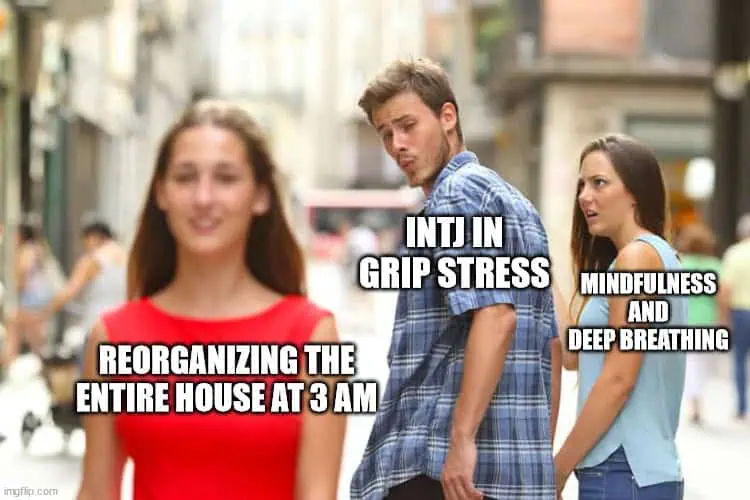
If you’ve dealt with chronic stress as a child you may struggle to fully come into your own and accept your own natural talents and strengths.
Chronic stress often pulls us into “grip” behaviors, where we rely on our inferior function in unhealthy ways. For example:
- An INFJ under chronic stress might act impulsively and recklessly, mirroring unhealthy Extraverted Sensing.
- An ESTP, in contrast, might withdraw and obsess over negative outcomes, driven by Introverted Intuition.
These grip reactions are often mistaken for personality preferences, especially during prolonged periods of stress. If your behaviors feel unnatural or out of character, it’s worth exploring whether stress has pushed you into this state.
You can find out more about the grip in my article: What Each Personality Type is Like in the Grip of Their Inferior Function
Questions to Ask Yourself For Deeper Clarity:
- “Have there been times when I’ve acted in ways that felt completely unlike me? What was happening in my life then?”
- “Which behaviors in my daily life feel natural and fulfilling, and which feel forced or reactive?”
- “Do I ever find myself relying on characters that aren’t usually associated with my personality type? Why?”
How to Avoid Being Mistyped
- Take the test in a calm state. Avoid answering questions when you’re stressed, anxious, or overwhelmed.
- Reflect on your natural preferences. Think back to times when you felt happy and relaxed—what attitudes felt most authentic to you?
- Learn the cognitive functions. Understanding these deeper aspects of personality can help you identify your true strengths.
- Work with a professional. An MBTI® practitioner who has studied the effects of trauma can provide personalized guidance. Speaking to a therapist can also help you to root out what’s “you” and what’s a trauma response.
I’m a certified MBTI® practitioner and offer type clarification sessions and would love to help. However, if you’d rather speak to a licensed therapist, I have a friend who offers coaching sessions who is also trained in Myers-Briggs theory. You can find out more about him here.
What Are Your Thoughts?
Childhood trauma shapes us, but it doesn’t define us. By understanding how stress and coping mechanisms influence personality, you can reconnect with your true self. Your type is like a lens through which you view the world—sometimes trauma distorts the lens, but with the right tools, you can see yourself clearly again.
What about you? Have you felt like trauma influenced your type results? I’d love to hear your story in the comments. And if you’re ready to explore your type further, consider checking out my eBook, Discovering You: Unlocking the Power of Personality Type.

Other Articles You Might Enjoy:
The Learning Styles of Every Myers-Briggs® Personality Type
What Your Child Needs to Hear Based on Their Myers-Briggs® Personality Type
How Each Myers-Briggs® Type Can Feel Lonely (And What to Do About It!)
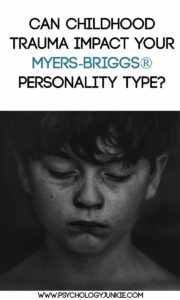
Get Your Free eBook!

Subscribe to our newsletter and get an eBook packed with powerful parenting tips for each personality type! Enjoy 28 beautifully illustrated pages exploring the needs and strengths of all 16 personality types in childhood.


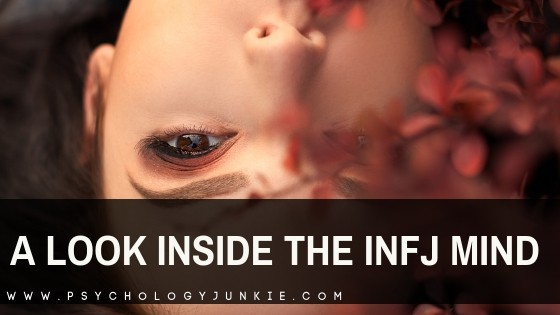


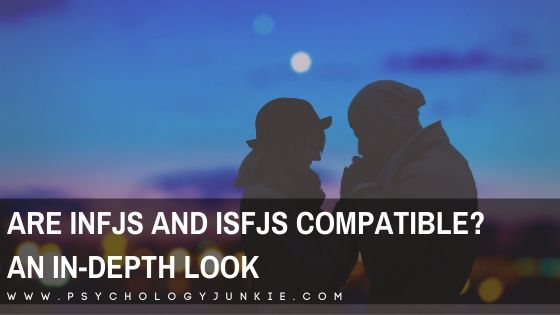


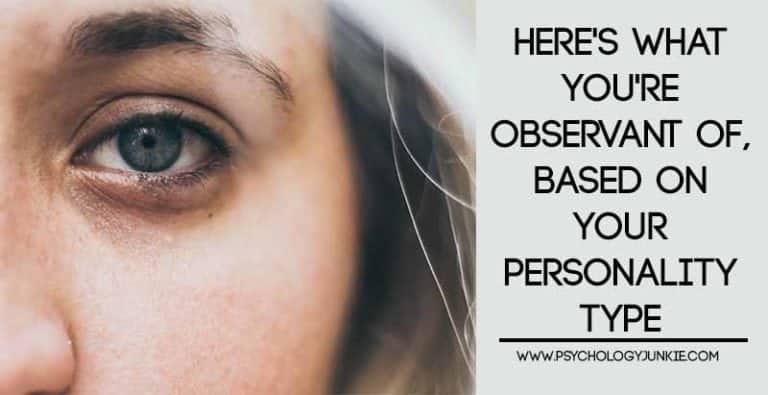
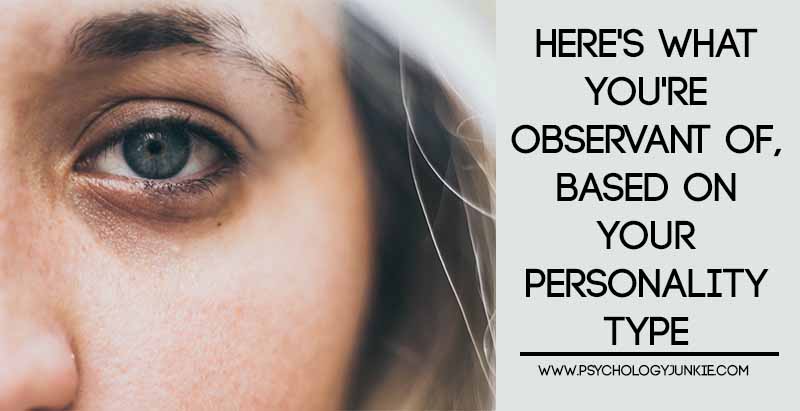


I am an ENTJ and I have a friend who is an ENFP, who has experienced childhood trauma. Whenever she takes those personality tests she says, “Well I used to be more (blank) but since I have been hurt/squished I am now (blank).” I was always fascinated by this and wondered how personalities could be affected by traumatic events in one’s life. I keep reassuring her that she is an ENFP even though often times she doesn’t act like one. This has led me to research how upbringing, stress, depression, and trauma can effect one’s personality type. For example I am an ENTJ, but I am very different from most other ENTJ’s I know because of my upbringing. I grew up in a family with an INTJ parent (Who is also very different from most other INTJ’s), who was always interested in reconciling people and was very in tune with people’s emotions and I have learned to recognize what others are feeling more than other ENTJ’s. So thank you for this article, I enjoyed learning about how trauma can effect how your personality type is expressed. I am going to forward it to my friend so that she can realize that she isn’t crazy, and that trauma does influence how your personality type is expressed. I look forward to your upcoming articles about the levels of health for each personality type!
Thanks again!
I can relate to your friend. My result is Enfp but when I was younger I had different results. More on the “I”… now i’m still confused whether I’m really ENFP or ENFJ
I’m adopted. My biological mother have tried to abort me many times. She was said to have been raped. I grew up with lots of insecurities. Feeling unloved and rejected. Not seeing the love and acceptance by the people who surrounded me when I was younger.
Though it’s better now, I still have that “loop” feeling
Wow, this was amazing. Thank you so much for posting this, you’ve really helped me understand my Dad more.
I’m an INTP, and I’m sometimes mistaken as an INFP. I experienced traumatic experiences growing up. I’m not going to go into the details, but let’s just say it’s a particularly horrible circumstance for an INTP to be in or any child regardless of type.
As a result, I was in a Ti-Si loop for over a year. Luckily, Dragon Ball Kai (technically, this is the correct name) started airing during that time, and it helped me tremendously!
Anyway, about a year later, I picked up running. After running for 2-3 weeks, I wanted to make it more interesting, so I decided to copy the mentality of a DBKai character at a certain point in the series. I’m not going to say what it is, because it’s a major spoiler, but that’s what I did.
After doing this for about 2 weeks, on and off, listening to music while I did it, I noticed some interesting things. My body would tingle for short periods of time, I’d feel more confident, and I’d feel more powerful mentally, emotionally, and to a very small extent, physically.
I didn’t think much of it at the time, but I decided to keep doing it out of curiosity. I tweaked it a bit based on my intuition until I figured it out.
Over 6 years later, the tingling sensation is incredibly strong, and I can send it rushing throughout my entire body. Apparently, I was entering a state of mind common in the martial arts world that sends neuroelectrical signals to certain glands/organs, telling them to increase my adrenal levels, and I was using my Fi in the process. Go fig.
My Fi is now about as strong as my Ne.
I have been reading a lot lately about the personality types. I find I strongly identify with much INFJ facts, but consistently get ISFJ on my own type tests. I have begun pondering on my own whether my type is actually masked by the traumas of my own childhood. I suffer from major depressive disorder with suicide ideation with PTSD from chronic emotional, physical, verbal abuse as a child. Then, today, here is your information. Thank you. It helps so much to know I am not crazy-weird. Thank you. Oh, thank you!
Excellent article 😉
I have four adopted sons with traumatic childhoods. It has been a challenge to discover their true mbti types, but it was easier (as you said) when I dove into the details.
Yes, knowing the cognitive functions can really help in those kinds of situations! I’m glad your sons have you!
I just wrote a post over on my WordPress blog about my experiences in this regard. Some thing that has been important for me is that because I was raised by a woman with mental illness and I was basically her extension, I have a huge confusion about my true personality and preferences, because I was trained to quash anything that wasn’t approved. When you add that to the trauma and emotional abuse you get a very snarled knot! Thank you for writing about this.
I am so sorry that you experienced this, that must make things especially confusing and difficult. I will have to look at your blog, thank you for your input on this!
Hi Susan – Thanks for your blog about this. Like yourself I’m an INFJ (CPP tested) though for years I thought and even occasionally tested (non CPP) as an INFP – the common and classic mistype mistake as per another of one of your excellent articles. Anyway when really stressed I often revert to my inferior type and act out a particular behaviour which I recall I adopted as a coping mechanism during my difficult childhood. Basically I clean house! I think I do this to offset the fears and emotional turmoil the stress is causing me. Its as if I am automatically trying to order and make perfect my immediate environment. Still occurs even though I’m now in my autunnal years of life – though of course I’m more aware of this behaviour these days, plus on the upside I have a clean place! Again thanks for your website and the tremendously helpful articles you post.
Thank you, Susan! Was waitng for this article for the logest time.
Heyyy AlphaINTJ!! Have missed seeing you on Twitter! I hope you liked the article, hope life is treating you well!
Ok, it’s only logical that one who has experienced a trauma can be easily mistyped. But can a trauma or something like that also change one’s actual personality type? So that then after what they have been through they aren’t the same person anymore?
I would say for me it likely has. Grew up with two parents who fought, daily. Being a girl on the higher end of the autism spectrum and having interests more suited for boys also got me into a lot of trouble with my peers. I played best with the boys, but the other girls resented this and teased me. The boys didn’t want the boyfriend/girlfriend association so would turn on me at recess at a moment’s notice. I resented on/off friends. I remember it angering me how they could be one way with me then act like bullies/ enemies when they met me with their other friends. I eventually told off one friend that I was sick of her doing that and more less did the door slam. Fortunately she moved away around that time so I didn’t have to keep on dealing with her.
I got bullied a lot growing up, so…. I likely hid one of my functions and grew up in an NI-Ti loop. Tested first in middle school as an ISTP based on my hyper critical perception of my flaws. Retook it and either got INFJ and rejected it because it was too idealized to be me. Took it again and got INFP. Believed I was some odd INxP from then on. To Ti minded to be INFP but with a more Fe type feeling than the Fi authenticity. I struggled to figure out my type until I came across one of your blogs talking about the Ni-Ti loop.
That was how I figured out I must be an INFJ who’s life experiences and being bullied caused me to reject the Fe. At least until now.
How can someone revert back to their original type.
Thank you for this post. I tested as INFJ but the test was tricky for me because I had to think about what I would really do if I hadn’t had my past or if I had my druthers. Sorting out coping mechanisms has been possible with all the healing I’ve done but even a year ago, I probably would have tested differently. Yes, the tertiary dominant loop…I know it well. I have more recently become more adept at feeling in general and actually decreasing my dependence on my tertiary T function regarding explaining myself. Whew! I really appreciate you sharing your wisdom.
Hi Meredith! Thanks so much for your feedback! Coping mechanisms can definitely make it harder for us to type ourselves correctly. I have done plenty of Ni-Ti looping myself! I’m really glad that you have found more clarity with time and I’m glad to have you here on my page 🙂 Let me know if you come up with any questions at all!
I think this is quite accurate. It totally makes sense too. I think web type indicators are extremely superficial and often ‘silly’ in the way they project questions that concern one’s behavior patterns and thinking/feeling style. They are one dimensional and poor and it’s no surprise that I’ve had several different results. First, I got INFJ, then INTJ, then INTP which up until recently I thought was my correct type based on many relatable traits I’ve read on this type. Except I recently discovered that the introverted type I am more in tune with, based on its traits, is the ISFP. Pretty crazy considering how all these types have several different functions. I attribute this typing confusion on the fact that due to trauma in early youth, I’ve been going on extremes to hide and suppress my true awkward, aloof but very deeply emotional self, preffering a ‘colder’ approach in life, one that would not have me vulnerable or weak. So I think since I have a lot in common with the INTP, my trauma induced brain gravitated towards what I considered to be the.’ideal’ type for me, instead of my accurate one.
What I find difficult, being an INTJ and victim of childhood abise, is that there are overlaps between normal INTJ functioning and effects of abuse. For example, when I’m zoning out, am I deep in Ni or in a dissociative state? I know many who would consider my difficulty immediately recognizing and affecting emotion to be a symptom, having lost the trust early in those around me. For example, though it’s never been tested with anyone closer than aunt and grandparent, I do not seem to experience grief at the same level others do. I’ve never tested as anything but INTJ, I just wonder sometimes through which lens i should view my own behaviors.
I believe it affected me greatly. As I needed to go into self protection I tested much different at 16 than now. I felt I needed to hide in an INTP shell. I now test and have for many years as an ENFJ.
I don’t quite agree with this article, I am a domanent infp, have been through a lot of trauma and still score as an infp. I was diagnosed with two personality disorders, including bpd and PPD, ptzd and five anxiety disorders, and bipolar 2, I take those mental health problems more internally though and I don’t really act extroverted when I struggle I tend to keep those things in my mind. I also developed connective tissue diseases from PTSD, I have about six of them. According to health care professionals PTSD does cause connective tissue diseases in women. But I mean I’ve always been infp and i am still infp, pretty set in my ways too. I’m a kind girl though i have a lot of problems but I read an article from this site called the “unhealthy infp” I relate to that a lot. But i don’t believe that ppl will score the exact opposite on a test bc of trauma, it doesn’t make any sense to me at all. Everyone has their own opinions and I apologise if my message comes off as being kind of harsh.. that’s not how I want to come off. I just tend to trust articles intuitively so I tend to get a little upset when I read something that i can’t relate to and don’t agree with
From one INFP to another. I feel for you having so many “disorders”. Have you ever looked into a cleanse? You tube Dr. Morse grape fast. I’ve done it before and it always helps with my mental health. My problem is that I can’t ever stay on a cleanse long enough. Hope it helps you…
It doesn’t really make you more Extroverted however, it is more towards the functional stacks that affects your personality.
For example, a friendly and open minded INFP can become extremely defensive and insensitive like a unhealthy ESTJ.
I’m an INTJ who, due to childhood trauma, often mistypes as an “F.” I think this is because I’m more alert than the average INTJ to the social-emotional atmosphere around me. It was my protective mechanism as a kid (and maybe still today).
I’m an INTJ that always tests as 1-0% preference T>F, and I know I strengthed the hell out of my tertiary function when my parents divorced. The divorce didn’t affect my sister though because she’s 4 1/2
Years younger and didn’t really have memories of us as a family. I hadn’t realized at the time cuz i was just young boy, but It hurt so much I immediately went into a Ni-Fi loop with an unhealthy disposition towards my inferior Se…I’ve known about my loop even b4 I knew that that’s what it was called because I had to conquer it, but thanks to this article I was able to have an epiphany on the progress and development of my character…and thanks to you sharing your own experiences which correlate and share similarities with my own I was able to coalesce my vague intuitive understanding into a singular coherent personal truth…which I’m sure no doubt will lead me to deeper more profound understandings and insights of and into myself.
Truly and Honestly, thank you for this opportunity and especially for your patience if read all this ?
I was molested and raped by my father since baby days. My mother knew but saved her status and image in society. For years l adapted to the people around me to blend in and protect myself from hurt. Discovering myself, my likes and dislikes was quite a journey. I also started talking a LOT more. But too describe what happened, how it made me feel et. etc is so difficult. I can walk away from my family without a backward glance and live a wonderful live.
An interesting experiment has just occurred spontaneously in a very large Facebook complex trauma survivors group. We discovered that a vast majority of us have the rare INFJ personality type. I’d be fascinated to see an analysis of this phenomenon.
As childhood trauma survivor and PTSD sufferer, I used to score as an INFJ. Years later, I am doing much better, and I now score as an ENFP.
My first therapist saw me as an introvert, and one day, he suddenly changed his mind , realizing I was probably an inhibited extrovert. He apologized rather profusely for the mistake, which I found weird because it was the least of my concern at the time.
Re-reading both descriptions, I can honestly recognize “the healthiest me” in the ENFP portrait, although I am clearly not as joyful and adventurous as most ENFP seem to be. The “sad and insecure me” may have some of the INFJ traits, but others poorly fit. I am definitely not a calm and gentle person. I understand how I may appear this way when I am depressed, but this is not me. Also, I never enjoyed being alone. I often have to isolate myself because I am hurting too much to interact with others in a way I found satisfying. But being alone depresses me. I am quite good at reading people but I never felt especially drown to helping or protecting them. So far, I have mostly been invested in protecting myself from them. I recently realized I was genuinely curious about others, and I have always been fascinated by our diversity.
As I understand it, INFJ would be the ENFP’s shadow. Interesting fact… or maybe mere coincidence.
For now, I am still more acquainted with my INFJ-like self than my ENFP maybe-truer-self. And an important part of getting better now comes down to accepting my more outgoing traits without shame.
I took the Personality Hacker version of the MB a few days ago, and the result was INFJ. Reading through many of your posts here, talking about that type, I felt like I had just found myself, and was “home”. I’m not “weird”, I’m just rare. 🙂
That being said, I was molested by my step father when I was ten. I told a baby sitter, who told her mother, who called family services. Back in those days (early 70’s) they were just started to deal with that kind of thing, and so, they kicked him out of the house for three months and then let him come back (very long story). He lived with us another five years, although he never touched me again, he continued to be a very abusive and controlling. He insisted I take math and science classes every year (loved the science…math not so much). Strangely, he encouraged my love of books and reading. He brought home boxes of books from auctions, etc. for me. (I found out years later, after he died, that he was always telling people that I was really smart). That did not negate the damage his abuse caused.
I am a recovering alcoholic, ex smoker, and currently 85 lbs overweight. I was diagnosed with Bi Polar when I was 39. I have struggled through many abusive relationships.
I wonder if a knowledge of personality types and how each type deals with trauma would be useful in helping those people heal? I feel like I need to do something do blow the whistle on the prevalence of childhood sexual abuse and reach out to those already affected.
Hi Connie, I prayed for you. I’m so sorry that happened and hope you are doing ok today
You are so brave and strong Connie! And you have a BEAUTIFUL smile:)
What an interesting read! Love it!
I have had a problem between testing as infj/infp since I have gotten into the MBTI subject. I still am not quite sure even after I’ve read about the differences and how to tell between the two, because there are some things that I just don’t see in myself or relate to. This makes so much sense that coping mechanisms may be coming into play.
This may help explain the struggle to identify with one or the other, even after six months of trying to figure it out… maybe?!
My childhood trauma was contracting Lyme. I was left undiagnosed for 30 years. It has negative neurological effects. I was in pain all the time and severely depressed. I typed as ISFJ, then for years INFJ. Now I have been treated and have counseling, INFP.
Go figure.
Completely explains why I had been testing as ENTP for years even though I am an ENFP. Still working on connecting to my auxiliary Si and it feels like trying to make something usable out of fabric that has big holes in it, but I’ve got patience and love the challenge of it.
Thanks for the article and your transparency. Your willingness to share about your life helps others who read this gain understanding and not feel alone!
My past was rough, starting with childhood. I’ve been in therapy for 20+ years, but I really only started to make progress about 5 years ago. The more I have been/am able to accept who I am, the more my personality evolves. My type hasn’t drastically changed, but it did change, and I have definitely noticed other subtle differences. I used to score INFP every time, and the tests that showed percentages for how strongly I scored for each part always showed high scores for all four parts. As I heal, it changes. Now I score either INFP or INFJ, and both the introvert/extrovert and perceiving/judging are close the the middle. I notice this when I’m trying to answer the questions, too. I feel like my answers are almost exactly in the middle of many of the options.
I think “introvert” is correct for me, just not to the extreme I thought before. I’m really not sure about the perceiving/judging function. I might figure out which one fits better, but I might just be close to equal parts of both. I do identify with both the INFP and INFJ descriptions, sometimes others, too. I’m always able to relate to/understand other INFPs and INFJs, too. I can even predict when someone has one of those types quite often. Even with people I barely know, like therapists and people in support groups. Intuition is the one factor I don’t ever doubt.
I actually had a conversation with my therapist about (basically) this subject a few months ago. I told her I thought trauma related mental health issues could influence personality type. I had been noticing (in myself and others) how things like hypoarousal, coping mechanisms, low self esteem/confidence, and/or toxic shame, caused by maltreatment and/or abuse, can have a lot of influence on someone’s view of themselves. What they view as their feelings and preferences might actually be things they did in an effort to keep the peace and/or be not be rejected or hurt. I also think having ADHD, that wasn’t diagnosed until I was 42, makes it hard to answer some questions. For example: I tend to be messy, unorganized, and spontaneous, but want/try to be/feel more at peace when I’m organized and structured. It’s very hard to figure out which things are inherently me, which things are ADHD symptoms, and which are things I only prefer because they minimize symptoms and chaos.
I definitely think you’re right. I think a lot of people hold on so tightly to who they believe they are that they can’t see other possibilities, often because they believe it would be shameful to admit their perceptions had been influenced by other people and/or maltreatment.
Well I don’t know if anybody will care but in case it could be useful to someone! 😀
It took me a very long time to figure out the “four letters” of my personality type. Well at least, I think I have found out my four cognitive functions. I still don’t really which personality type (ENFJ or INFJ?) exactly but for me, it’s not really that important. What I do know is that I’m probably unlikely to be INFP.
As a child, I was surely shy and sometimes daydreaming. But I was also very easy-going and (too) accommodating. My mum used to scold me for giving my stuff to other children in the class for example. I was always looking for a good group of friends, pleasing and being nice to everyone. Other times, I was quite stubborn and trying to draw people into joining a cause. I went as far as building a little environmental group when I was about 11.
Then when my father suddenly passed away, it was a huge shock for me and my family. All the harmony was just shaken up. And after reading about MBTI types and grief, I understood what happened to me. I only wanted to show to my family that I was strong and not that I was suffering. In fact, I was completely oblivious to my own needs. When I entered the first grade of high school the same year, I was more interested in finding new friends than in dealing with my own problems. This was the beginning of hell. I was shunned by my peers at school, misunderstood by my family (probably because I wasn’t opening up).
I quickly withdrew from any social life. From having many friends in elementary, I ended up with no friends in high school. At “best”, I was taken advantage of by other people who told me they were my “friends”. Then at some point, I started building myself defenses against the world. I was “independent-minded”, i needed nobody. I started being interested in finding “who I am”. When I came across the MBTI test during my teenage years already, I tested as an INFP, which is what I believed I was. Now, I understand why I repeatedly got “INFP”.
I went on with my life. I went abroad for some time, went to college. I met the man who’s now my boyfriend, I made new friends who were actually nice. And I realized there was something off with the fact that I would be INFP, even though I didn’t want to admit to myself at first. I discovered the cognitive functions and I was just more lost than ever. I felt I had more Fe than Fi but also more Se than Si (I love food so much). What about the Ne then, especially if I was always jumping from one idea to next? Well it took me a very long time to understand this but an ENFJ or an INFJ could have very well some Ne. The thing is to wonder whether it’s “healthy” for oneself. Having so many possibilities is actually too overwhelming for me, I prefer to have one plan where I can direct myself to.
What happened is that the trauma made me slip into someone (INFP) I was not. And I’m only starting to realize that now, as I’m slowly but surely getting on with my life. If someone out there has been in the same situation as me, don’t lose hope, it only gets better.
I appreciate this comment, thanks for posting! I see some similarities between your experience and mine — very popular in elementary school, then completely shut down in high school after transferring, which is certainly traumatic, but funny enough, wasn’t the bigger trauma, which was happening at home my entire childhood. Looking back, I think I dissociated from myself entirely and denied the obvious truth of the abuse I was enduring. While I didn’t have any close friends in my “new” high school, I had one friend from my previous high school who I hung out with on the weekends. In school however, I just made sure my makeup and clothes were perfect and kept my mouth shut, hoping not to rile up any predator who might target me for bullying. It actually worked, but it was a lonely, isolating experience that in some much smaller ways mirrored my home life. I’m still working on getting over the home life trauma, as the dissociation from my experience and enmeshment with my abuser parent lasted well into adulthood. Without that headspace ever allowed in order for me to face the truth of my upbringing and family, and thus begin healing, I was doomed to live as a shell. I used to think that healing was all about finding my way back to me, and that’s part of it, but I now see that it’s also about finding a way forward as me, whoever she is. As I read recently somewhere, our MBTI may be what we are, but it isn’t who we are, and I would add that when who you are is the recipient of long-standing abuse of many kinds starting in infancy, it casts a long shadow over yourself so that the truth of what and who you are takes serious study and commitment. It’s no wonder that some such as me type as INFP, as healthy, authentic INFPs are naturally drawn to intense self-study and personal development as they encounter and entertain so many possibilities about who they can be to live a fulfilling, meaningful life. The tip-off for me though was reading about Ne and realizing that I don’t enjoy exploring and exhausting numerous ideas as much as I naturally home in on what my essence really is residing inside me already, albeit somewhat stubbornly obscured by internal noise.
I would echo your encouraging words to others not to lose hope if they feel a similar lostness, if that’s a word. Keep striving, but be patient with yourself. You’re worth the wait.
Thank you for writing this article and sharing your wisdom with the rest of us who are survivors. I last year came to realise that what had happened to me during my school years was sexual assault, and was not my fault. I’ve been using typology to try and explore myself, on how I can be the best version of myself and relate better to others. Although my journey has been very confusing, with me going from being convinced I was either INFP or INFJ, to now wondering if ISFJ or even ISTJ fits better. I know I am a Ne and Si user rather than Ni or Se. So I guess I made progress.
Anyways . I’ve found it hard to see myself “from the outside”, since I have quite low self esteem and don’t trust my own understanding and insights. Though I had some counselling earlier this year to address my trauma and trust issues. I’m not “fixed”, and I’m still very anxious socially. But I know now it wasn’t my fault and that it’s actually perfectly normal for me to have trouble figuring out my own type…yeah I’ve felt so foolish for not knowing with confidence my type.
I did take the MBTI test and scored INFP however I have been video typed by a few practitioners; one seen me as ISTJ, the other as ISFJ, and as INFP. So I do feel really ambiguous and fake; like I’m deceiving people.
So it was really comforting to read this article and get an explanation as to why my type seems to elude myself and others. Thank you for speaking up, as a fellow survivor and as a guiding light for typology 🙂
For anyone who has suffered trauma, particularly child abuse, I recommend reading “The Body Keeps the Score” by van der Kolk. Be warned however, that this book is, as you might imagine, quite triggering. I was perpetually shellshocked all over again for weeks after finishing it over a month’s span.
I also bring up this book because something very illuminating was touched upon in it: In formal psychological practice as we know it, there was a shocking lack of acknowledgment of the pervasiveness of child abuse, even well into the 20th century. I wonder to what extent this glaring omission in psychiatric circles shaped Jung’s theory of type, and by extension, Myers and Briggs development of the MBTI.
As for me, I’ve been typed as INFP as well by the official instrument after receiving two prior poor-fit results. I don’t think INFP is correct either, but the practitioner seemed to think as much, so I didn’t object. I can tell you that, out of everyone in my office who has been typed by the same practitioner, I relate the most to the ENFJs and INTPs, but I relate the absolute least to the ISFPs. I do think I was born an extravert with a feeling process, and I do know I can’t stand to be in conflict with someone, even people I don’t know well. Such a situation will make me literally lose sleep and figuratively tie myself in knots. I can’t be okay again until I know I am okay with those in my sphere, even people I don’t like. (Or until I’ve decided the relationship isn’t worth it.) As I’ve matured as an adult, I know it’s impossible and somewhat perfectionistic and counter-productive to expect people you don’t like to like you anyway.
Thanks for writing this, and thanks to those for reading and sharing!
This helps a lot. Initially right now I was trying to search ptsd and the possibility of finding the wrong enneagram type but realized this test could be useful as well. I think years ago i used to think i was enfp but more recently before i found things out about myself I have leaned more towards entj or Estj. I found out last year that I have had ptsd depression and anxiety my whole life and when I found out it opened a can of worms so to speak. I have always felt somewhat lost but when I found this out I realized I had no idea who I truly am. I’ve started to question if who I really am is hidden and hard to find (which is why idk which type for this test that I am or why Idk which enneagram type I am) because of the ptsd. It seems like PTSD can mask who a person truly is and cause them to think and do things only because of trauma they haven’t healed from. If they heal, who’s to say who they were before in their most unhealthy state, is who they’d be now in their most unhealthy state. I’m so confused and question if I’m ever gonna know who I truly am and it scares me. I don’t trust myself to pin point anything now that I know I have ptsd and feel like I’ve been faking who I am for as long as I have been alive. I feel like my real self has been hiding from.. myself. My ptsd goes all the way back to when I was 5. I’m not super old. I’m in my mid 20’s. But it’s causing a lot of confusion. Help. Anyone. I just wanna know if when a person has that condition, does it mask the real results? Like I stated earlier. Someone who is aware they have ptsd (ptsd I know doesn’t go away but we can heal from the traumas and learn to cope) can heal and really deep down be a completely different person once they’ve healed.
I have CPTSD from childhood traumas, abuse, and neglect. I have felt introverted my whole life, but my environment was so volatile growing up that expressing myself could’ve been dangerous at times.
I learned to be quiet and observant. At work now, away from my family, after over a year in trauma therapy, I am talkative (sometimes quiet still), and very interactive with the guests, and it is easy. Whereas before, I would never have even spoken to others. I can say I’ve had “imposter syndrome” where I felt fake around everyone, and I wasn’t doing it on purpose.
My emotions, and also my self expression, have been suppressed and repressed for so long, I didn’t know how to let the real me out with anyone.
Inside, I want to dance and sing like no one’s watching me. I want to play and be light-hearted.
I have felt a shift in myself. And that “wild inner child” wants to come out and enjoy life. To not be so on edge, to laugh and play with family and friends, to discover what life will be like when I’m not constantly looking at everyone through a trauma lens. I’ve had traumas since birth, of varying sorts, so this is all completely new for me.
It is truly like an unintentional mask is coming off. 🙂
Im.an esfp as you know esfps are fun loving,spontaneous and extremely charismatic. They love to enjoy nrw experiences and they dont like boting or repetitive tasks they get bored very eadily if something is not happening in their life.. so i was an extremely fun loving esfp. But when i was in 3rd grade,i got shifted to some other city and was not ready to accept the fact that im leaving my previous city, im leaving my old friends actually i was not prepared to change .. i wasn’t prepared to meet new people i oved my life so much that i wasn’t ready for change . And when i got shifted to a new city , i took much time to adjust, but something was wrong i became inferior and was not like i used to be before but somehow i managed during my childhood i adjusted with new people though having inferior intuitive. But when i reached 10th i m in stress and idk what to do
My sister had a very traumatic childhood event, made worse by a mother who had her own childhood issues. My sister is convinced she is an INTJ, but she demonstrates many non-intj behaviors. She is striving to be the perfect INTJ, but I worry that it is only compounding her discontent. How do I help her?
This article was more than helpful for me. I was diagnosed with c-ptsd due to a traumatic childhood. I am trying so hard to find my mbti type but I fail everytime. Although I’m using the cognitive functions, I literally have no idea what my coping mechanisms and what my personality traits are. I have a really high introverted sensing, but I’m quite sure that’s because I always need to feel safe and the only way for me to feel safe is to compare present situations with past ones. I also don’t know if I’m more emotional than I act deep down, because I’m scared to be vulnerable and always needed to suppress my feelings. Id really love to know my mbti type but at the moment I feel like it’s impossible. So thanks for telling me why.
As a 74 year old male, I find myself comfortably in the ENFP type. And I somehow survived an emotionally abusive childhood so I have c-PTSD. Luckily, I happened to have a perceptive psychologist so I overcame major determinants of my PTSD through EMDR (eye movement desensitization reprocessing as discovered by Frances Shapiro).
I feel another perspective on the MBTI analysis is the difference between public persona and private persona. The public persona often displayed in work environments is shaped by the needs of the individual to be successful in his desired career. I’m surprised by the successful actors with an introvert MBTI but then again, their ambition to be a successful actor requires that certain extrovert auxiliary persona to be successful.
Since my father was a narcissist, I didn’t really shut down my feeling dimension. I instead became more sensitive in recognizing my father’s destructive narcissistic traits to keep myself safe as a child. I thus became more sensitive to the feelings of others early in life and more empathic as well. But my brother didn’t develop that empathy. Children of narcissistic parents seem to either become more empathetic or to develop more narcissistic traits to survive childhood.
After spending Christmas w/ my family, this topic has been on my mind. Since my father was an explosive narcissist, I feel like my testing results as INFJ w/ extraverted sensing being dominant, may not be exactly correct. How can I know if my sensitivity to other people’s moods is due to survival in childhood OR is it just the way I am? Untangling that is tough.
Hi Susan,
Again, such a thoughtful and incisive article.
I feel no stranger to childhood trauma, having commenced boarding school just before the age of six, and continuing for twelve years, with trauma renewal after every school holiday. Hmm.
Your work here is greatly valued. Thank you.
(Generally test ISFJ)
Thanks for this insightful article. Due to circumstances in my early days, I still feel that I am never good enough. That I should achieve more in life. Because of the stereotypical representation of some of the types, I did not consider ENTJ as my best-fit type at first. Rather, I was convinced that I was an INFJ. After more introspection and studying extensively about the MBTI, I realized that you do not have to be a manager or CEO to be a ‘true’ ENTJ. Probably, my enneagram type affects my type as well – as I am 784 tritype (sx/sp 7w8). I believe that my ‘branding’ of ENTJ is also called the creative subtype (ENTJ-C). I would say that I am an ENTJ with developed Fi and weak Se, probably with a strong INTP unconscious as well.
The experts say that personality is inborn, but they also say that type can’t be known for sure until the teenage years or adulthood. Yes, trauma or environment can modify behavior, but when that behavior becomes habit that persists for years, then in a way that new behavior is our new personality. After so many years of acting a certain way, it may be impossible to return to one’s original personality. And is it really helpful to answer questionnaires as you would when a child, before trauma/environmental influence, if the result will only spit out your personality as a child, and not who you are today?
For me personally, I think I started out as INFJ, and I still feel like one except when it comes to being optimistic about people and emotionally validating people. Because I lack those things, people will say I’m not really an INFJ. I became more like INTJ as I got older, after suffering years of bullying/teasing/shunning. I developed thinking to guard myself against cruel people. I still feel the pain they inflict on me, but I don’t outwardly show it. I wear a mask of cold indifference. And I don’t bother to be kinder than having good manners, because what’s the point in going above and beyond when they will not show me the same courtesy? Why should I care about them when they don’t care about me? I consider myself an INXJ, in the middle between feeling and thinking. My feeling side is still in me, but my thinking side got highly developed as well. I can’t deny either side exists.